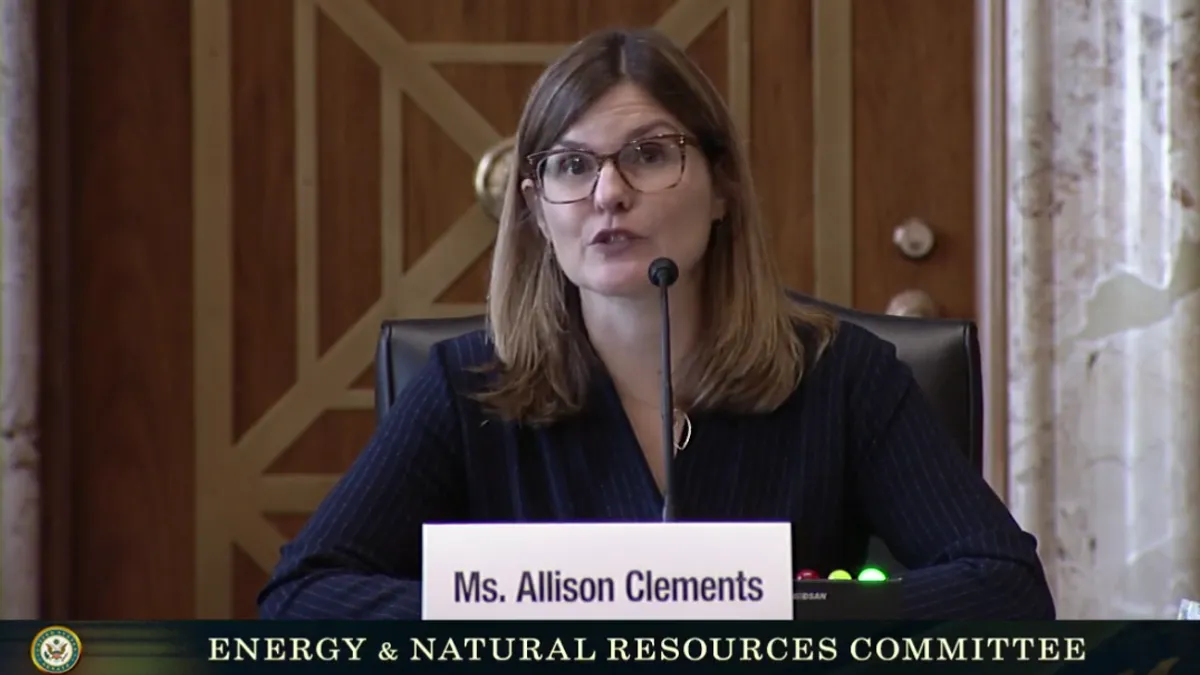Dive Brief:
-
Federal Energy Regulatory Commissioner Allison Clements made clear during her first meeting on the commission that climate change will play a role in her decision making.
-
Though FERC's obligation to ensure just and reasonable rates and avoid unfair discrimination has not changed, "the factors influencing consideration of these legal standards in each instance have become significantly more numerous and complex" over the past few decades, she said during Thursday's open meeting. "These factors also include the grave threat of climate change," said Clements. The Democratic appointee was confirmed to FERC earlier this month.
- Commissioner Richard Glick, a fellow Democratic appointee, has long pushed the commission to take a similar approach to regulation, and Commissioner Neil Chatterjee, a Republican appointee, has also signaled he's willing to look at carbon mitigation "where appropriate," including through carbon pricing.
Dive Insight:
Tension over FERC's role amid a rapid power sector transition and the mounting urgency of the climate crisis has been heightened over the past few years. Federal inaction on climate led to a wave of state-set emissions reduction targets and strengthened renewable portfolio standards. And those policies triggered opposition from unregulated generators who worried state preferences for renewables were creating unjust market conditions.
Under that framework, FERC's majority has unveiled a number of rules in an effort to address "distorting" market effects that clean energy advocates and state leaders have characterized as an attack on state efforts to reduce carbon emissions.
Glick has consistently been the sole dissent on such orders, similarly arguing those actions suppress state's rights, and Chatterjee has begun to signal that he's willing to focus on issues that lower barriers to clean energy technologies and incorporate state desires to reduce carbon emissions. Chairman James Danly, a Republican appointee, has made it clear he views FERC's role as an "adjudicator" and disagrees with FERC's involvement in policies such as carbon pricing.
Clements' signal on Thursday gives the ideologically split commission greater ability to forward a clean energy agenda.
"Maybe even before the Democrats have a majority of the commission that work might get going with Chatterjee, [Glick] and Clements," said David Spence, Baker Botts Chair in Law at the University of Texas School of Law, and Professor of Business Government & Society at the McCombs School of Business. And Clements' point went beyond climate change — other external factors she noted include increasing cyber threats, a growing demand for grid modernization and rapidly maturing clean energy technologies.
"Embracing evolving realities, just as the Commission has traditionally done in its regulatory efforts towards efficient outcome is a precursor to satisfying the commission's statutory obligations, and will underlie my approach as a commissioner," she said.
That stance is entirely appropriate and within FERC's jurisdictional grounds, Spence and other legal experts agreed. Though commissioners, including Chatterjee have cautioned against FERC sliding into the environmental regulatory realm, often in response to Glick's criticisms of FERC approving natural gas facilities without considering their impacts on climate change, FERC stakeholders say that isn't what's happening here.
"[T]o be clear, I don't read this as signaling that, given the chance, [Clements] would somehow make FERC into ‘an environmental regulator,'" said Justin Gundlach, senior attorney at the New York University School of Law's Institute for Policy Integrity in an email. "I think her comment reflects a widely held view: climate change bears heavily on the energy sector in numerous ways, so if FERC is doing its job properly it can't ignore climate change — just like it can't ignore new energy technologies, cybersecurity issues, or other salient features of the landscape in which it operates."
Clements and Mark Christie were confirmed by the Senate Nov. 30. Christie, who previously served on the Virginia State Corporation Commission, will be sworn in in January.














